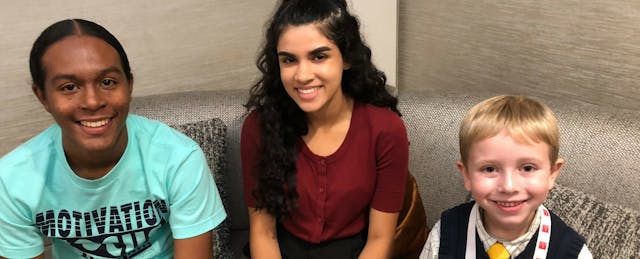What motivates students to excel in STEM may be less about the classroom or curriculum, and more about their individual interests and ambitions. But how do teachers tap into their particular passions to inspire them to achieve in the classroom—and throughout life?
Most multi-day conferences kick off with high-profile celebrities, authors or “thought leaders.” Not so at EdSurge’s first Fusion conference. As about 600 eager adults filled the Marriott ballroom in San Francisco for the opening session, EdSurge CEO Betsy Corcoran, in concert with Digital Promise CEO Karen Cator, introduced a trio of students who would set the tone for the next three days.

“We often ask, ‘Who is that amazing educator who made a difference?” Corcoran told the audience. For Fusion, she tweaked the script: “We wanted to start the day by thinking about who was that amazing student who made a difference in our lives. Who was that student who was so compelling, how did they get the courage and the tenacity to do what they do and persevere?”
These are no ordinary students. For two of the three, this was not their first time in the spotlight.
Zaina Siyed, a 17-year-old high school student from California, is known for pushing back on negative Muslim stereotypes by competing in robotics competitions through her nonprofit, FemSTEM. Her work was recently featured in an L.A. Times article. Nate Butkus, a 7-year-old elementary student from Illinois, started his science podcast and recently appeared on the Ellen Show. Jeremiah Jones, a 16-year-old musician, motivational speaker and entrepreneur was recently awarded for his community nonprofit work by Los Angeles Mayor, Eric Garcetti.
Though diverse in racial composition, age and socioeconomic and geographical backgrounds, these students shared one thing in common: Personal circumstances, outside of the classroom, inspired them to create and work in STEM fields.
“When I lived in Chicago I liked to wake up early. While my dad and I were waiting for my mom to wake up, [he] needed a way for me to stop screaming, so we decided to start watching videos of the Mars Rover,” Butkus explained to the crowd, recapping a story his father told. “The YouTube videos were long enough to keep me busy while my mother was sleeping, and it inspired my mind to love science.”
When asked why Siyed wanted to start a nonprofit for Muslim women, she noted the lack of positive representation of women of color in the media. She specifically cited the incident where Ghazala Khan, silently standing next to her husband, Khizr Khan, during the 2017 Democratic National Convention, was criticized by President Donald Trump. “The stories that came from the situation with Khizr Khan’s wife at the [Democratic National Convention] hit me. The goldstar mother who was being asked why wasn’t she speaking? It is because she is oppressed? It is because she is Muslim? That is the representation we see on the news,” Siyed explained in an EdSurge interview.
Siyed saw tech as a place where Muslim women could gain positive media attention. “The world of tech is the most influential world right now to be in, so I thought if I can inspire some other girls and they can be in the forefront, then we can start hearing news stories about Muslim women in tech who are leaders,” she continued.
Jones, who grew up in a rough part of Los Angeles and witnessed many of his peers being bullied and struggling with low self-esteem, said those experiences inspired him to try to change his community.
Throughout the panel, the students were brimming with self-confidence, uttering phrases like ‘believe in yourself and you can do it.’ And when pressed for actionable tips they offered some solid advice behind stage.
“Giving students a sense of the bigger picture, giving them meaning by letting them know their work can translate into a career, and letting students know that there are others in their same situation was very useful for me,” says Siyed. Also, she adds that “online communities are really important to be engaged in and that is something teachers can really try to connect their students with.”
In addition, Siyed notes the importance of relatability, recounting how mentorship from other Muslim women in STEM-inspired her to do her work. Butkus’ mother echoed those sentiments, describing how her son’s public school, in an effort to personalize the learning experience, paired him with a teacher that shared his passion for science.
Butkus’ teachers have also recognized his passion, embedding his podcasts within their science lessons and sharing his media coverage—including the appearance on Ellen—with his peers. His precocious knowledge of science also earned a spot co-teaching science for first-grade students. This validation and acknowledgment of Butkus’ passion, his mother notes, has encouraged other students in his class to start their own YouTube channels geared towards learning.
Yet, Siyed notes that teachers with many objectives, deadlines and testing constraints might have difficulty tapping into passions that don’t perfectly align with school curricula. “My school and some of my teachers are supportive of my work on the outside, but it is tough for teachers to replicate the kind of experience that I am giving to middle school girls,” says Siyed. “You have to have a much more fluid and much more dynamic teaching style.”


